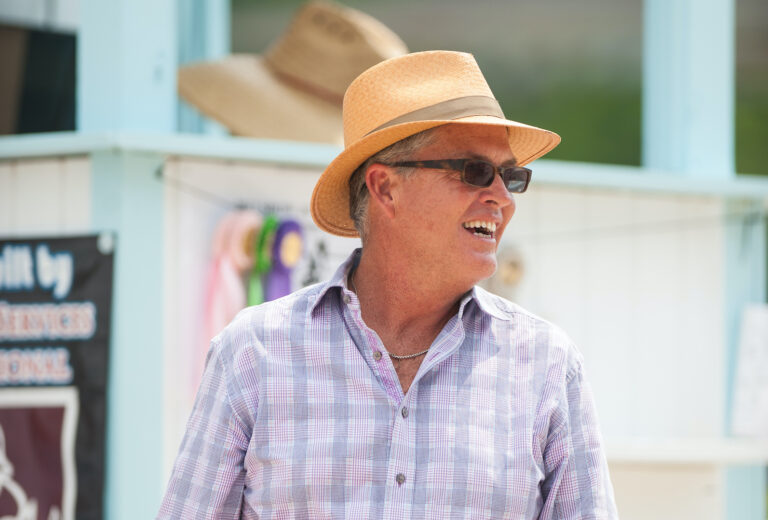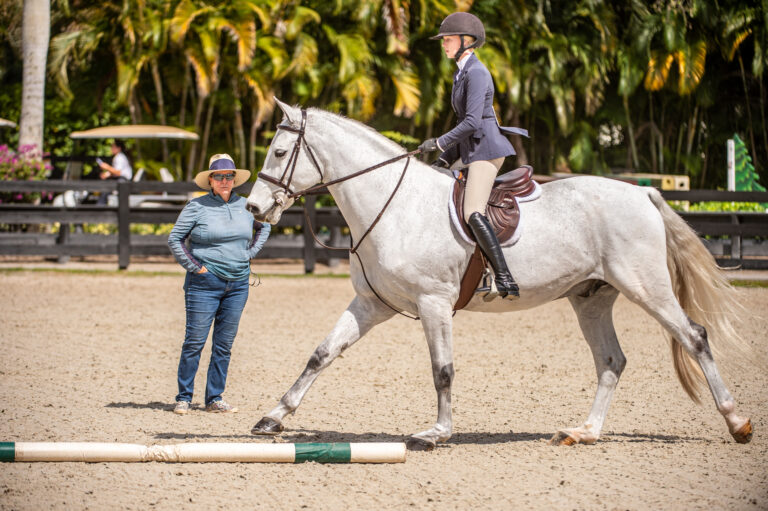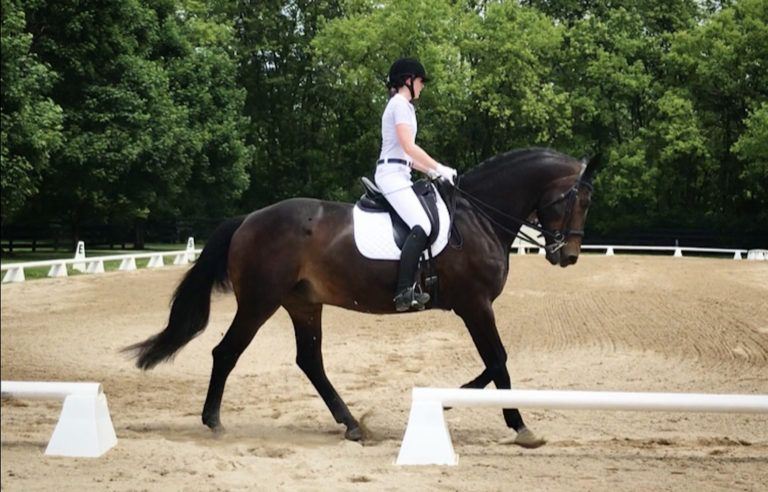Wearing a wireless headset and sitting in his wheelchair while teaching a jumping lesson, Kevin Babington didn’t hesitate for a second when asked whether he thinks about riding again.
“If I could get up on a horse, I would do it in a heartbeat,” replied Kevin, who was left a quadriplegic from a spinal cord injury sustained in a fall August 30 at the Hampton Classic in Bridgehampton, New York.
On the screened-in porch that has a view of the ring at his farm in Loxahatchee, Florida, Kevin is a long way from being the rider who finished fourth individually in the 2004 Olympics. But he’s also a long way from the man who was left nearly motionless after his top mount, Shorapur, fell with him in the Long Island show’s grand prix qualifier.
Kevin insists that if he could swing into the saddle once more, he “wouldn’t be nervous about getting hurt.”

Amy K. Dragoo/AIMMEDIA
After five surgeries, 27 days of hospitalization, 71 days in a rehabilitation facility and ongoing therapy, Kevin is at the point where he is active in the equestrian community again, despite his condition. The operations ranged from neck stabilization surgery—because he tore all the ligaments in his neck in the fall—to a tracheotomy and appendectomy.
Kevin is able to give riders instruction; weigh in on the complexities of a course after his wife, Dianna, walks it with a student; and can critique the rides he sees in person, on video or via livestream.
The Accident
The accident came at a time when the 51-year-old native of Ireland was enjoying one of the best seasons he’d had in years. Less than two months before his fall, he delighted fans by taking first, second and third place in the $100,000 Great American Insurance Group Grand Prix during the Lake Placid Horse Show in New York.
Then at the Hampton Classic, he delivered a fast 4-fault round halfway through the $75,000 Friday grand prix qualifier aboard Super Chilled. He contemplated scratching Shorapur from the class, since he knew his first score earned him a place in Sunday’s $300,000 grand prix. Kevin mulled over taking Super Chilled in the big class two days later, then thought again, since Shorapur was more experienced and had won the grand prix in 2014. If she goes in [the qualifier] and she’s spectacular, he told himself, I’d be crazy not to use her.
That is how Kevin made a life-changing decision to ride Shorapur on the fateful Friday afternoon. Trouble came early in the course. The mare had a rail down at the third fence, an oxer, before the combination at 4ABC, which made the seven strides to the triple “a little aggressive,” Kevin recalled.
There were some refusals and falls experienced by other competitors at the combination, composed of an oxer one-stride to a vertical, with two short strides to another vertical.
Shorapur jumped the A and B elements, but left the ground early on her way to C, Dianna said, guessing the mare thought it was going to be another one-stride, rather than two. “She just crashed. She couldn’t make it over.”
Kevin hit the turf hard.
“It was definitely too short,” he maintains about the way the distance between the combination’s B and C elements was measured. The situation was complicated because by the time he rode Shorapur, who went 42nd of 64 on the start list, “there were shadows also. Horses were just really confused.”
Although neither he nor his wife have watched the video of his fall, “I pretty much remember everything. I knew right away I couldn’t move my legs or my arms,” Kevin said. “Normally, I’m the first to pop up off the ground. But this time, I knew it was different from anything I’d ever felt before. I asked the people who came over not to move me.”
Luckily, Shorapur was not hurt. That was the only high note in what had started as an agreeable day at one of the country’s best shows but that had spiraled into a nightmare journey—with the emergency room as the first stop.
The Injury
Although Kevin didn’t break his neck, Dianna explained that what happened to him “was like this hyperextension, whiplash.” The doctors told her there was a contusion at neck vertebrae C3 and C4. “It’s like a giant bruise within the spinal cord,” said Dianna, referring to the damage caused by the trauma. “You really don’t know how much the cord is damaged until the swelling recedes. And the damage is done by the pressure of that contusion.”
Dianna, who met Kevin at a horse show 30 years ago, is someone who always handles what needs to be done. For instance, she decided to enroll in law school after Kevin ran a facility under a contract that took advantage of him. Vowing that would never happen again, she got her degree in 2001 and practiced law for five years, but eventually segued into working full time with Kevin and his clients.
So it was true to form when she immediately threw herself into studying everything about her husband’s condition and what could be done for him.
Those around Kevin and his many friends immediately pitched in to help. Dianna’s sister, Daun Imperatore, who runs Babington Mills, the family’s feed and bedding company in Pennsylvania, immersed herself in research while Kevin was still in the emergency room. She advised that dropping Kevin’s body temperature and administering steroids to reduce swelling was the way to go.
Kevin and Dianna’s daughters, Marielle, 14, and Gwyneth, 17, are “essential workers,” according to their mother. They assist her in lifting Kevin off the couch at night, feed him and lend a hand with physical therapy. They help out in the barn and also are pursuing their riding, which makes their father happy.
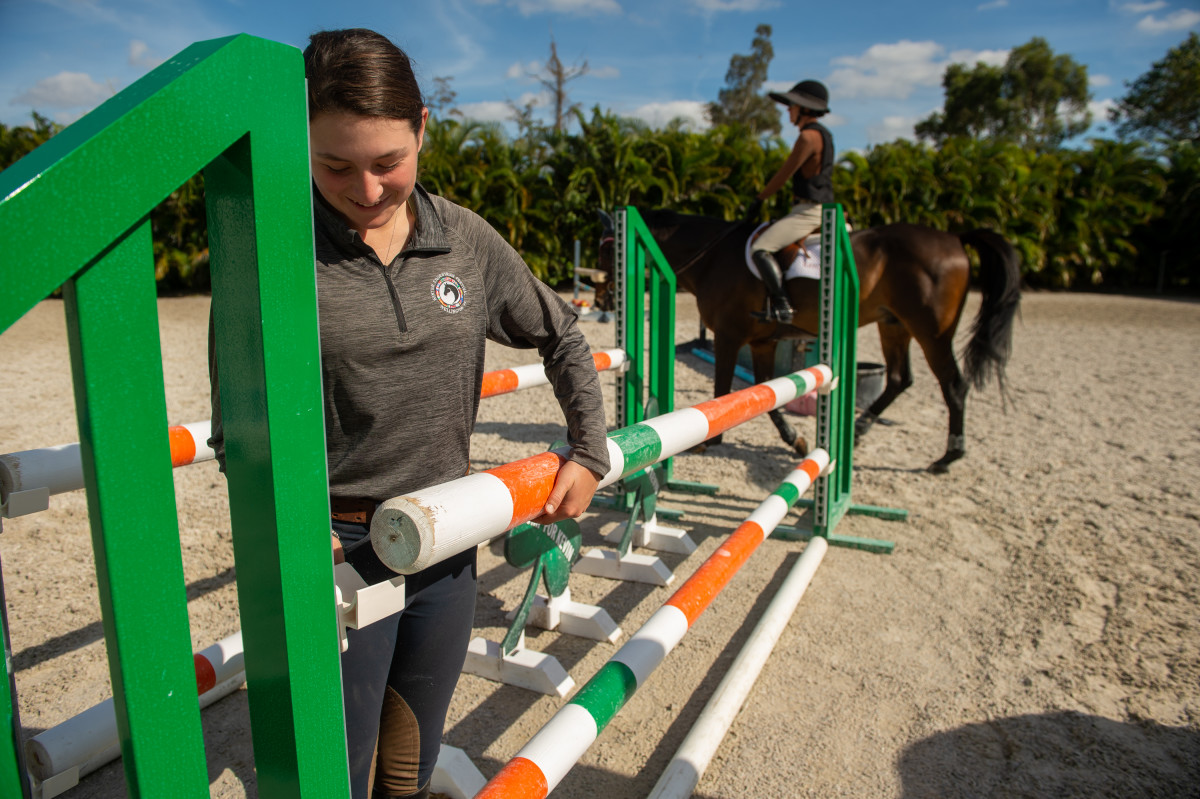
Elizabeth Sponseller, who served as Kevin’s barn manager, stepped up after the accident to take her boss to physical therapy. “I try to fill in the gaps helping out with him, so they don’t have to pay an extra person,” explained Sponseller before moving on to another job because only a few clients stayed with the business.
Adding to the Babingtons’ worries about Kevin’s condition is its daunting financial side. The Christopher & Dana Reeve Foundation estimates it costs $3.5 million to $5 million to support a complete quadriplegic for a lifetime. (The late actor Christopher Reeve was confined to a wheelchair after he had a fall from a horse.)
While support from the equestrian community has been outstanding, at the same time, the fact that Kevin no longer can ride prompted some of his customers to leave. That has caused even more financial hardship. A barn that once housed 27 horses now has less than a handful related to the Babingtons’ business.
Kevin, who has kept his Irish citizenship while residing in the U.S, is the youngest of 11 children born to a wool merchant who was also a politician. Kevin moved to the U.S. in 1987 as a riding instructor at a Vermont summer camp, eventually making a name for himself when he went to work in New Jersey for former U.S. Equestrian Team show jumping coach Frank Chapot.
From there, Kevin became involved with international competition and achieved dramatic success with Saly Glassman’s Carling King. In 2001, he was part of the Irish gold medal team at the European Championships and finished eighth individually at the 2002 World Equestrian Games in Jerez, Spain. At the 2004 Athens Olympics, Kevin came incredibly close to the podium with a fourth-place finish.
Still Teaching
With Kevin’s care the priority, the Babingtons have adjusted their lives and expectations. Shorapur has gone to Ireland to be bred. Her embryos will be transferred to a surrogate, though Kevin expects she someday will carry her own foal. Meanwhile, Kevin sold his share in Super Chilled to Debra Wycoff, who was his partner in the horse. Kevin’s friend and fellow Irishman, Jonathan Corrigan, is now riding the up-and-coming grand prix mount.
“I feel there are very big shoes to fill. He’s a hard person to follow,” said Jon of Kevin, who is giving him advice on how to handle the horse. Kevin’s accident is etched in Jon’s memory. “I was there when it happened. I went out to the ring to him. It sticks in my head a lot,” he said.
He noted how devoted Kevin is to his sport, even though he’s seeing it from a different vantagepoint these days. “All he wants to do is watch it and help and be supportive to people in it,” Jon commented.
One of the clients who stayed with the Babingtons is amateur-owner jumper rider Hayley Carlson. She and her husband, Toby, own Ketcham Farm in Monmouth County, New Jersey, Kevin’s northern base and where he hopes to return later this year.
“Kevin is a genius at what he does,” said Hayley during a break in a lesson from Kevin. “I feel blessed and lucky every time I get to ride with him. He’s able to pinpoint what I need to do to help my riding. It’s wonderful.”
She feels it has been a smooth transition from the way they previously worked together. “There’s really no difference, except he used to every once in a while jump on [the horse],” she pointed out.
Dianna’s expertise has helped Hayley make the adjustment. “I kind of get the best of both worlds,” Hayley said. “She’ll tell me a few things to do, then he’ll tell me, and then when you go in [the ring], you’re overly prepared. I’ve had some good success, but it’s impossible not to, because it’s a good team effort.”
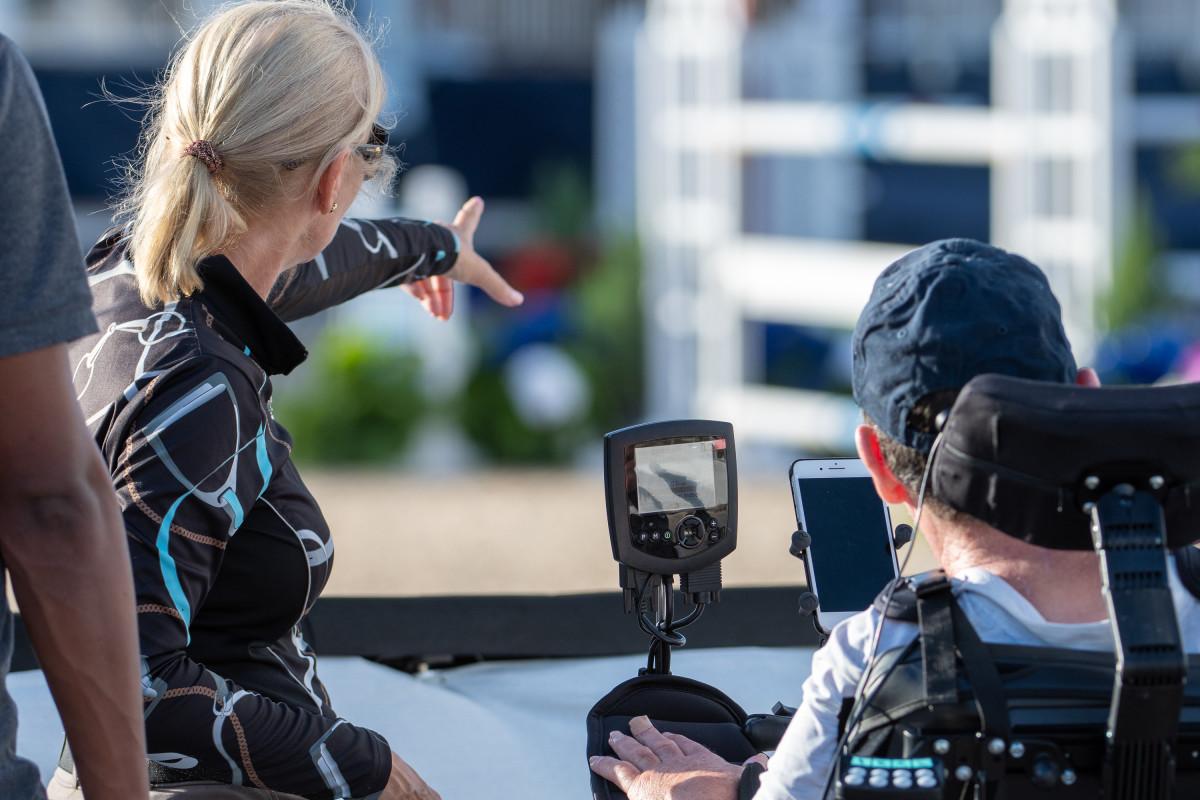
Not everyone realizes that Dianna is a skilled instructor herself, having learned from the best—her husband—and in partnership with him delivers a valuable equestrian educational experience. Riders still can get top training from the Babington stable, even with Kevin on the sidelines.
“When he was a grand prix rider, everyone wanted to ride with him. Half the people got pushed to me because he was so busy,” Dianna pointed out. “Now he has plenty of time to actually teach. Teaching is mentally riding. I think it would be terrible if he doesn’t have that outlet.”
Getting Stronger
Nine months into his new life, it became obvious Kevin was making progress.
“He’s getting stronger,” said Dianna. Kevin has worked at it with his characteristic determination, going for therapy on a treadmill where his steps are guided robotically, although that had to stop when the gym was closed because of the COVID-19 pandemic.
He is using a hyperbaric chamber in a series of 40 visits that have helped improve his lung capacity, which means his voice has been strengthened. Dianna goes in the chamber with him to assist, since he can’t raise a hand to blow his nose. He also works with a physical therapist at the same facility. At home, he works out on a physical therapy bike.

Amy K. Dragoo/AIMMEDIA
Kevin’s situation is not static. He has experienced a tingling sensation, as well as twitching in his right thigh, then in his left thigh. In May, he suddenly had feeling in his left heel, and in June, he had slight movement in the thumb and two fingers of his right hand. After his injury, he had movement in his neck and shoulders. Since then, he has some feeling down to his hips, including his left arm, although it’s not all the time.
“Something is happening. He’s definitely getting some sensation back. Saying it, it sounds monumental. It’s still not life-changing, but to me, what that means is that there’s hope,” mused Dianna. “It’s literally hour by hour. If you get ahead of yourself and start thinking about what you don’t have, that’s when you start to freak out.”
The Mayo Clinic in Minnesota screened Kevin for a clinical trial that utilizes stem-cell injections. Doctors there found that except for a bit of hypertension and his injury, he is in excellent health. They liked the fact that he was an Olympic athlete. After a delay because of the pandemic, plans called for him to go back to Mayo in July for the second phase, in which adipose tissue taken from his body will be spun to deliver stem cells. On another visit, it will be injected into the spinal cord, with the hope the cells will travel to the injured area. That is to be followed by physical therapy for a month.
“We’re just hoping that maybe it will push him a little bit,” Dianna said. “We’re trying to keep the business running, but for me, the priority this year has to be Kevin’s recovery.”
The pandemic has complicated Kevin’s situation in other ways, too. His condition makes him high-risk, so he has to be isolated as much as possible. “One of the things he enjoyed most was having visitors,” said Dianna, who has gotten used to setbacks and disappointments. “You can’t lie down, you have to keep fighting,” she insisted, displaying the same spirit that made Kevin a champion and keeps him going now.
“Sometimes, I lie in bed and think we could have full recovery, be financially stable or have no recovery and lose everything,” explained Dianna. “For the first time in my life, I feel like I can’t control anything and I have stopped trying to. I have just followed the path in front of me. If he doesn’t get full recovery, then we’ll figure it out.”
For Dianna, who is spearheading Kevin’s health care initiative and trying to keep the business going, there is no rest. She still shares a bedroom in the small Florida house with Kevin, which means she is awakened when an aide comes in at night to take care of him every two hours.
Friend to All
While Kevin’s show record demonstrates his ability in the saddle, it is his character that has inspired much-needed help.
He is well-known for his generosity of spirit and action. He’s the guy who stops to help someone with a horse trailer who has a flat tire on the highway, takes wandering turtles off the road, offers a space in a clinic for free to a child without the means to pay for it and is a vegetarian because of his respect for animals.
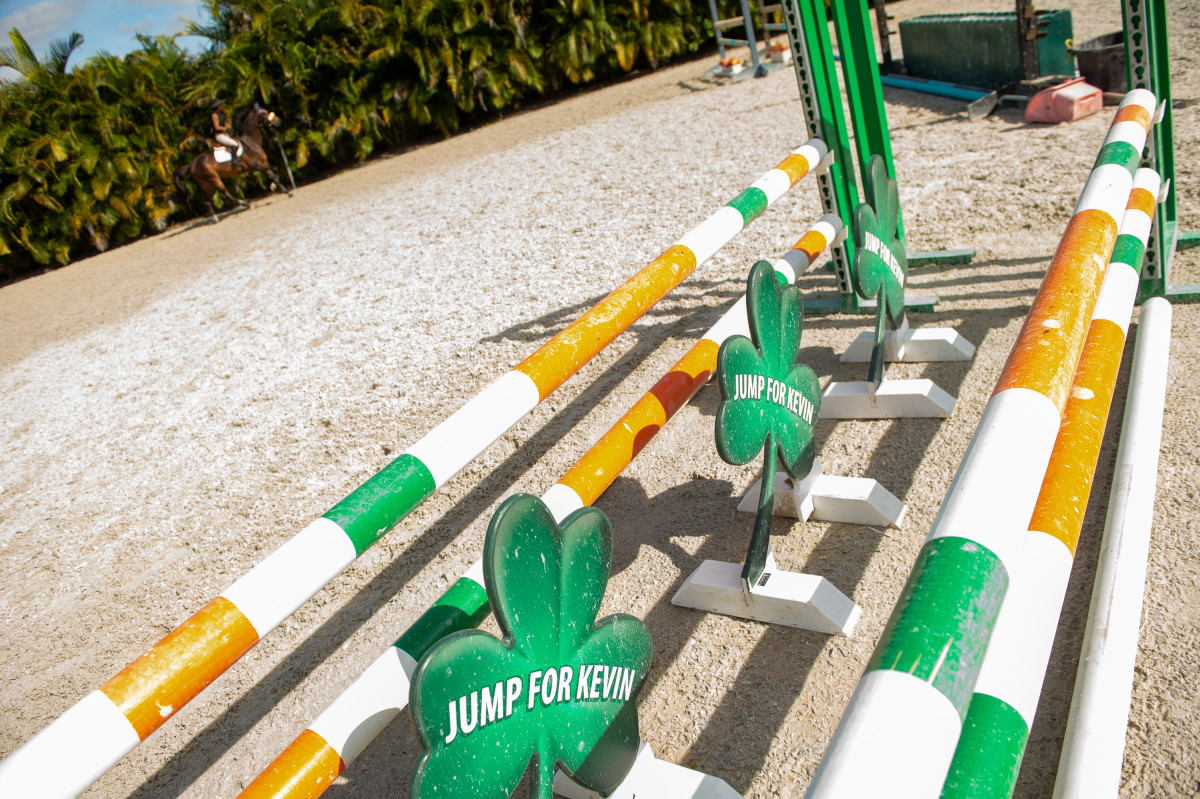
Amy K. Dragoo/AIMMEDIA
When an accomplished beloved rider got into trouble, those in the show world understood it could happen to anyone. “I think it hit home. I think a lot of people realized, ‘Holy cow, it could be me,’” said Dianna. “Kevin always did everything for everybody. I think it stung a lot of people. They were upset to see it happen to somebody like him.”
There have been numerous fundraisers for him, from horse shows to a drag queen karaoke evening featuring the likes of Olympic gold medalist Nick Skelton. Someone donated a private plane so Kevin could make the trip to the Mayo Clinic in comfort. An anonymous donor paid for entry fees at the Winter Equestrian Festival, which enabled Marielle and Gwyneth to keep competing.
The first of what is meant to be a series of annual horse shows at Duncraven, a New Jersey stable where Kevin once was based, raised $30,000 last year. And fellow grand prix rider Juan Pablo Gnecco donated a 3-year-old he imported that sold for $30,000 at auction to benefit Kevin.
Always humble and gracious, Kevin is impressed that people are still there for him. “I’m blown away by it,” he said. “All the support around me has been amazing. It’s helped a lot mentally,” he continued, adding in a masterpiece of understatement, “You have days where it’s hard.”
He has received support from those who don’t know him, but those closest to him can easily explain why so many have come to his aid. “He’s always been a guy who’s there to help anybody—such a great person and a friend to all,” said trainer Missy Clark. Her husband, John Brennan, emigrated from Ireland to the U.S. with Kevin, and raced out to him on the field at the Hampton Classic after his fall.
Missy noted Kevin’s accident has been the catalyst for some jumper riders—including grand prix rider Quentin Judge—to start wearing safety air vests. Others at various levels are doing the same. “A lot of people are talking about it,” said Kevin. Dianna agreed, saying, “I would support it 100 percent, because some of [the vests] prevent the hyperextension of the neck, and it was the hyperextension of his neck that kind of got him.”
John is on the board of the Kevin Babington Foundation, which offers an ongoing way of raising money, since donations are tax deductible. The funds have enabled Kevin to buy a van and are helping with badly needed renovations to the Florida house, which is not wheelchair accessible.
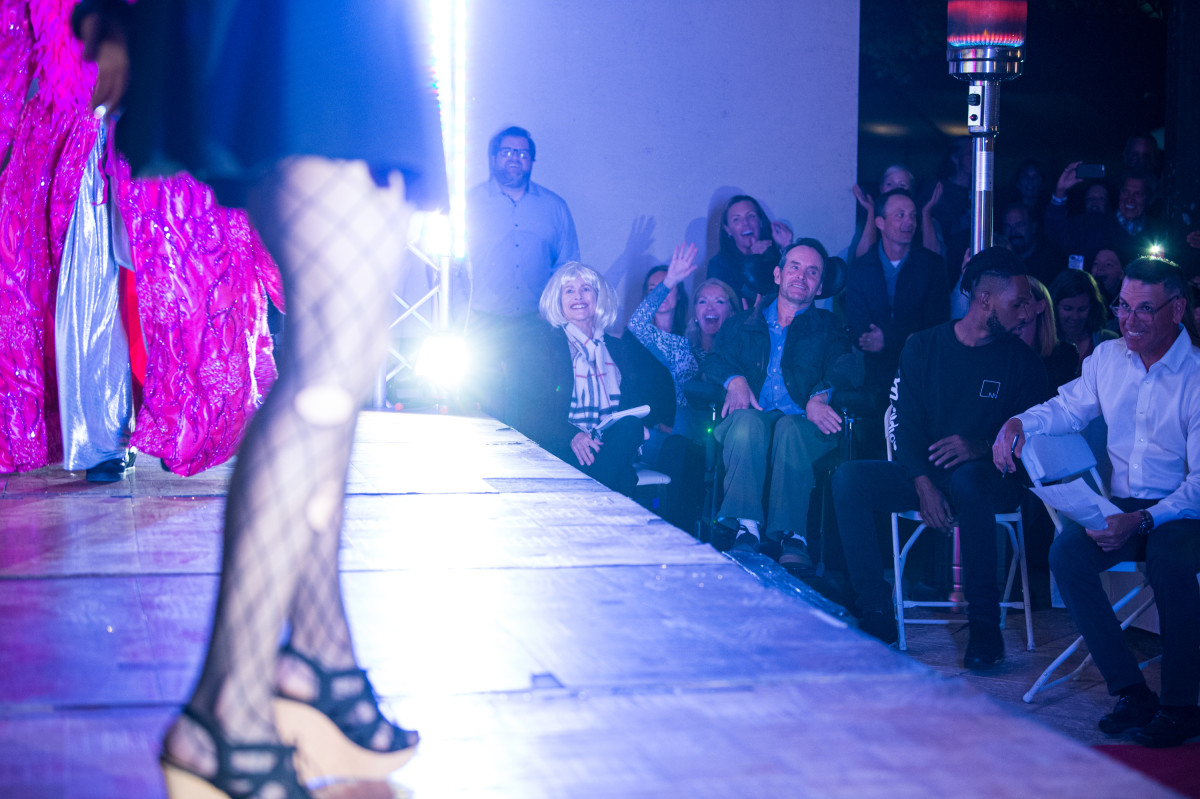
Amy K. Dragoo/AIMMEDIA
There also is the Babington Family Trust, for which contributions are not tax deductible. But it is vital, because unlike the funds donated to the foundation, it can be used for day-to-day expenses that are constantly popping up.
“Many people have made very generous and appreciated contributions, but Kevin will need extensive rehabilitation for an undetermined amount of time. The KBF hopes people will continue to donate, so financial assistance can be in place for Kevin, and for others in the future,” the foundation said in a statement.
Kevin’s initial surgeries, when he was hospitalized at NYU Langone, were not covered by the couple’s health insurance, leaving them with a $100,000 bill. Dianna noted things that Kevin needs are constantly cropping up. They recently spent $1,500 for a physical therapy table, for instance, where Dianna and the girls help him with exercises learned at the Mayo Clinic.
Asked how she and her husband keep going, Dianna responded, “We’ve always had a faith. Sometimes in your darkest moments, you kind of hit a jet stream of spirituality. We experience so much positive energy that it’s hard to be down too long.”
To make a tax-deductible contribution to the Kevin Babington Foundation, send an email to kevinbabingtonfoundation@gmail.com to obtain bank or mailing information. To make a contribution to the Babington Family Trust, send contributions (which are not tax deductible) to 13254 Casey Road, Loxahatchee, Florida, 33470.
This article originally appeared in the Summer 2020 issue.






